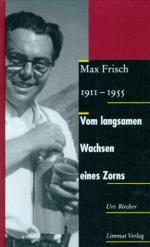|
This section contains 8,631 words (approx. 29 pages at 300 words per page) |

|
SOURCE: Russell, John. “Max Frisch, Sketchbook 1946-1949: Tunnel Vision, Twofold View.” In Reciprocities in the Nonfiction Novel, pp. 167-86. Athens: The University of Georgia Press, 2000.
In the following essay, Russell classifies Frisch's Sketchbook 1946-1949 as a nonfiction novel, contending that the way he orders his experiences in the diary “caused novelistic form to rise to the surface.”
Moving on from a satirist such as Céline, writing of the doomed Vichy French in 1945, to a diarist such as Max Frisch, whose jottings in Sketchbook 1946-1949 (Tagebuch 1946-1949, 1950) carry him through several years, over some of the same ground as Céline—though this during the war's aftermath, readers would be right to suppose that a more ameliorative approach to wartime calamities may be on view.
Starting out at age thirty-five, Frisch undertakes a series of trips from neutral Switzerland to the bomb-damaged cities of war-torn Europe, gaining access...
|
This section contains 8,631 words (approx. 29 pages at 300 words per page) |

|


